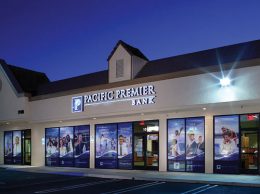Heritage Oaks accord strengthens BSA controls
IN THIS ARTICLE
- Banking & Finance Topic
- Elijah Brumback Author
By Elijah Brumback Friday, January 9th, 2015
After increased scrutiny from regulators, Paso Robles-based Heritage Oaks Bank is tightening its federal Bank Secrecy Act programs and policies.
The region’s largest community bank signed an agreement with the Federal Deposit Insurance Corp. that was made public at yearend. President and CEO Simone Lagomarsino told the Business Times the accord means the bank will “beef up” its programs and policies to head off future problems.
The decades-old BSA was originally designed to combat money laundering and tax evasion and it imposed strict oversight on internal controls.
Under the anti-terrorist provisions of the Patriot Act, regulators have been tightening banking rules, especially on money laundering, with both major and community banks scrambling to meet new requirements. According to industry experts, the toll of the new requirements has been harder on community banks that often have fewer resources to remedy their problems.
The regulations aren’t new, in fact they’ve been coming down the pipe since roughly 2008, but banks up until recently have been moving slowly to make changes in regulators eyes.
“These Bank Secrecy Act and Patriot Act regulations aren’t something we didn’t know about,” Lagomarisno said. “But there is a higher level of scrutiny or focus now than there has been in the past.”
Heritage Oaks Bancorp, the parent company of Heritage Oaks Bank, announced it was buying Mission Community Bank of San Luis Obispo for $56.4 million in cash and stock in October of 2013. The deal closed early last year. As the merger was proceeding, Lagomarsino told the Business Times, that the bank did not pay enough attention to its BSA controls.
The FDIC agreement stipulates that Heritage Oaks must develop or revise a written BSA compliance program, establish a system of internal controls on par with the size, risks, and complexity of the bank and its customers, provide for annual independent testing of compliance and ensure oversight from a qualified BSA officer.
Additionally, the bank is required to implement a comprehensive written customer due diligence
program, complete a thorough BSA risk assessment and a risk-focused assessment of its customer base. The increased compliance regulations also require new monthly and annual reports.
Since Heritage Oaks signed the consent order, the bank has hired a new full time BSA compliance officer and put “significant resources” behind creating the new policies and programs, Lagomarsino said.
On Jan. 5 a newly created chief banking officer position that reports directly to Lagomarsino was filled by Rick Arredondo. Prior to joining Heritage Oaks Bank, he served as president and chief operating officer at Roseville-based Rabobank.
Enacted in 1970, the BSA was designed to help law enforcement agencies identify possible money launderers and drug traffickers by having banks report red-flag activity such as cash transactions of more than $10,000. Regulators can slap monetary fines and regulatory enforcement actions on banks that fail to comply.
Crack down
After the Sept. 11, 2001 terrorist attacks, the BSA’s scope was expanded under the Patriot Act.
Banks are now required to monitor and report a wide range of account activities and to implement a customer identification program as part of the effort to spot not only potential money laundering and tax evasion but also possible terrorist activity.
As previously reported in the Business Times, American Bankers Association has pushed back against expansion of the BSA reporting requirements, which it says can be particularly taxing on community banks with limited resources. The Bank of Santa Barbara went under a BSA regulatory order after issues with potential violations turned up during an examination.
“Banks of all sizes tell us that putting together the staff and resources to maintain this compliance is increasingly difficult,” said Rob Rowe, senior counsel with the Washington, D.C – based industry advocacy group told the Business Times in May.
The wider scope of the BSA means that Internet-based retailers, exporters or businesses that deposit and withdraw large amounts of cash, such as restaurants, can all cause a bank to come under heightened regulatory scrutiny.
“It used to be that a community bank’s customers were all doing business locally,” Rowe said. “Now with the rise of Internet retail and the global marketplace, there’s a lot more for a small bank to keep track of.”
Bill Watkins, executive director for the Center for Economic Research and Forecasting at Cal Lutheran University, said that in general all of the financial regulations issued since September 2008 place a proportionally larger burden on small banks.
“It’s become a very difficult environment for small banks, and that doesn’t bode well for job creation,” he said.
For Heritage Oaks, the increased BSA regulations has meant some loss of customers who were deemed to have too high of a risk profile.
“There are a handful of customers we’ve called and explained to that their risk profile is too high and will have to find a new bank, and there are others who we’ve asked for quite a bit more information from,” Lagomarsino said.












